|
  
| RUOI Home | Back | Continue with theme (page 3 of 5) |
Noteworthy Books on the Family

French Titles - continued
 Denotes that the book is either a translation or is available in translation. Denotes that the book is either a translation or is available in translation.
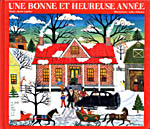
 Une bonne et heureuse année
Une bonne et heureuse année
Roch Carrier
Illustrations: Gilles Pelletier
Montreal: Livres Toundra, 1991
24 p. ISBN 0887762689
 Ages 6 to 10. Ages 6 to 10.
In this book, Carrier has given the reader a large and nostalgic glimpse of 1940 in his small village of Ste. Justine, Quebec: a large glimpse, because the preparations for New Year's Day start the summer before when "grandmother picked the cherries for the New Year's Day wine"; nostalgic, because it is a remembrance for family and community relationships that are universally valued today.
In early December the real preparations began. Then the house
was filled with smells of tourtières, fruit pies, cookies and
candies. After the opening of the gifts, the Carriers visited
the grandparents and the feasting, fiddling and dancing continued
throughout the day. More gifts were exchanged; and the jugs and
bottles were opened. For one four-year-old who fell asleep, the
day ended in a cavern among the mountain of fur coats.
With his folk-art illustrations (acrylics), Pelletier also
provides an in-depth glimpse of the times. His detail, minute
and accurate, embellishes the text with its own colour and
humour.
© 1991 text: Roch Carrier, art: Gilles Pelletier, published by Livres Toundra
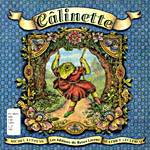 Câlinette
Câlinette
Michel Luppens
Illustrations: Béatrice Leclercq
Saint-Hubert, Quebec: Éditions du Raton Laveur, 1991
24 p. ISBN 2920660217
 Ages 3 to 8. Ages 3 to 8.
Célinette tells the beautiful story of a little frog who, feeling
bored, asks the various members of her family to play with her.
Unfortunately, they are all busy that day because -- surprise! -- her mother is giving birth to four more cute little frogs. The
story is told in a very appealing way and it is easy to make the
link with the human world.
The imaginative illustrations complement the well-written and
easy-to-read text.
Courtesy of: Éditions du Raton laveur
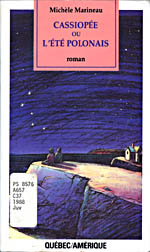 Cassiopée ou L'Été polonais
Cassiopée ou L'Été polonais
Michèle Marineau
Montreal: Éditions Québec/Amérique, 1988
Collection Jeunesse / Romans plus
195 p. ISBN 289037386X
 Ages 12 and up. Ages 12 and up.
Cassiopée, who is 14, lives with her mother. Her parents are
divorced and she refuses to accept both her mother's new
boyfriend and her father's new wife. To avoid going to summer
camp, Cassiopée runs away.
This is a novel charged with atmosphere, depicting the changing
world of a teenage girl: her rebellion, her running away, her
self-discovery, and the expression of her first love. The
situations and feelings are described with realism. The
characters, including the adults, are shown in a sympathetic
light. Cassiopée becomes more mature, finally coming to
appreciate those around her who love her.
Courtesy of: Éditions Québec / Amérique
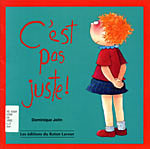 C'est pas juste!
C'est pas juste!
Dominique Jolin
Illustrations: Dominique Jolin
Saint Hubert, Quebec.: Éditions du Raton Laveur, 1993
22 p. ISBN 2920660233
 Ages 3 to 8. Ages 3 to 8.
"It's not fair!" says the little girl. All her friends seem to have so
many things that she doesn't have. Her dad listens patiently to
her complaints and gradually helps her realize that she has
something that the others will never have.
Children will cherish the illustrations and humorous details in
the story.
Courtesy of: Éditions du Raton laveur
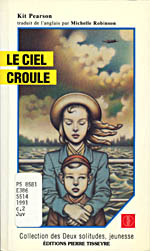
 Le Ciel croule
Le Ciel croule
Kit Pearson
Translation: Michelle Robinson
Montreal: Éditions Pierre Tisseyre, 1991
355 p. ISBN 289051440
 Ages 10 to 13. Ages 10 to 13.
World War II has reached the English shores. Norah Stoakes is
horrified when her parents tell her that she and her five-year-old brother Gavin are to be evacuated to Canada. Her denial,
anger and resentment are immediate and profound and directed
towards everyone. Only at the end as she learns acceptance of
others from Gavin and, ironically, acceptance of wrong in herself
from her Canadian hostess, Aunt Florence Ogilvie, does she
recognize the morass she has let herself sink into. The story
unfolds like a historical tapestry of personal and social
conflicts. The translation reads very well.
Courtesy of: Éditions Pierre Tisseyre 1991
|